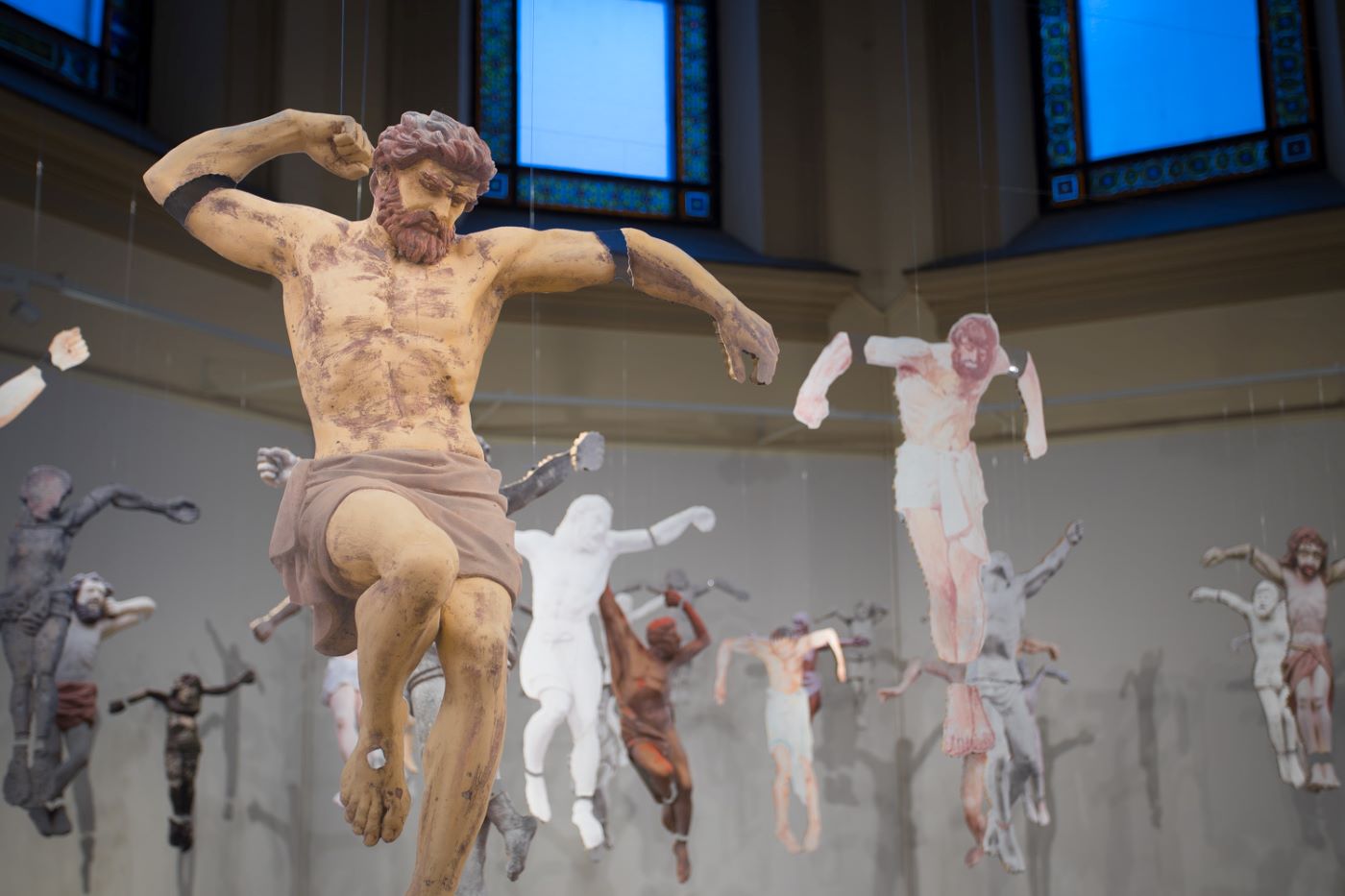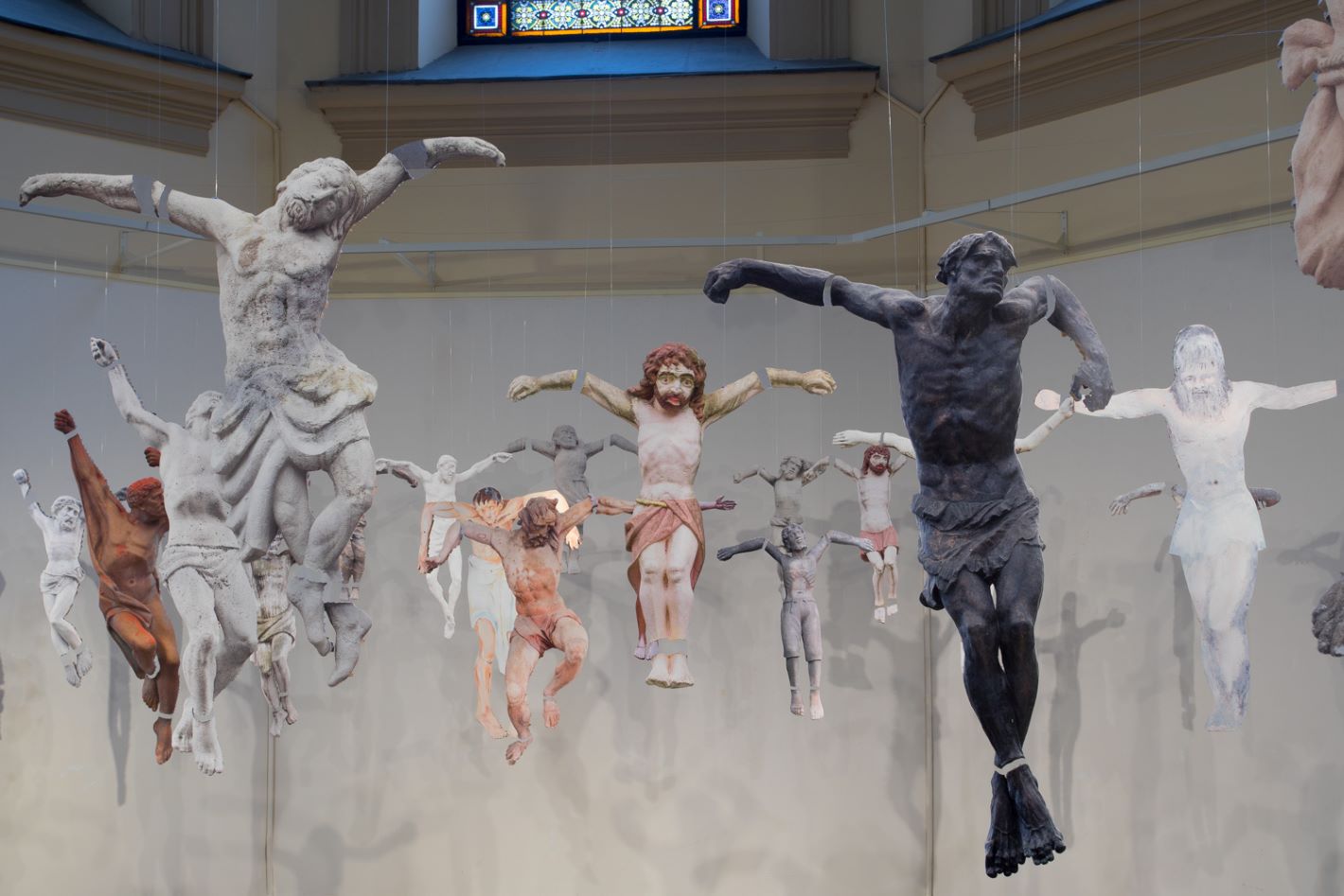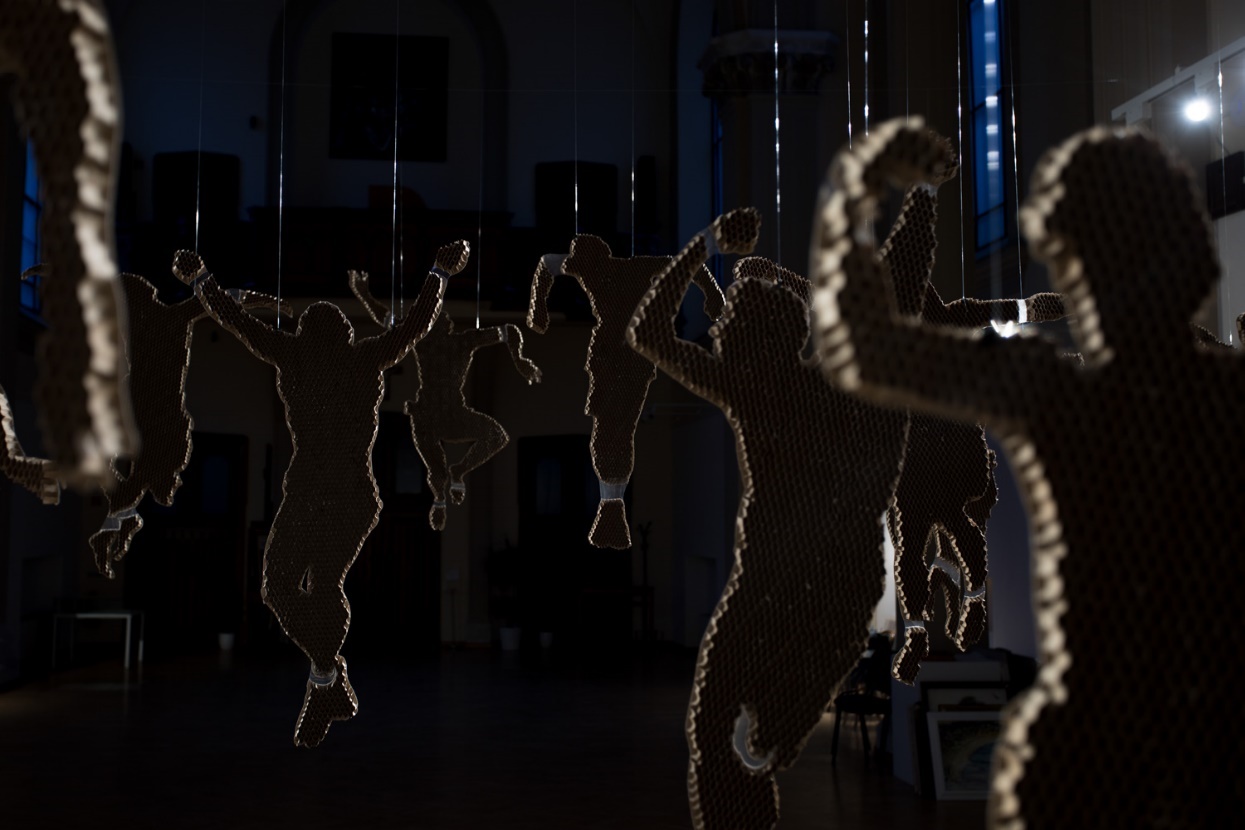Good Friday - Dismas and Gismas (the two thiefs)
Boglárka Éva Zellei: Latorlépés: Thief Step

Dismas and We
by Beat Rink
The installation by Hungarian artist Boglárka Éva Zellei shows us something strange: figures are suspended in the choir area of an old church where otherwise the figure of Christ crucified would be seen.
But these are not printed copies of Jesus figures (mounted on honeycomb panels). Rather these are copies of old sculptures of the criminals who were executed to the left and right of Jesus. How can we know this? The most obvious sign is that the arms are tied to the horizontal beam of the cross and not nailed. This corresponds to Christian iconography, in which the intention is to emphasize the injustice suffered by the Son of God by showing Jesus with pierced hands and feet, while the criminals suffer a less cruel punishment. Here we see not simply two criminals hanging there, but many. What is the significance of that?

The Bible does not tell us what the two criminals were called. The Christian tradition, however, assigns them the names Gismas (or Kosmas) for the one who mocked Jesus and Dismas for the one to whom Jesus promised paradise. The same tradition says that Dismas hung to Jesus’ right (for the viewer on the left). In many pictures, therefore, his head is inclined to the left, while Jesus in return inclines his head towards Dismas. Gismas hangs on the other side and sometimes is even represented as turning his back to Jesus.
It is striking that in the installation by Boglárka Éva Zellei practically all the figures crucified in the choir area are inclining their heads to the left. The person concerned is therefore Dismas.

The installation can be interpreted as follows: There is only one criminal. All of us should hang there. We are all Dismas. In the words of the chorus in the St. Matthew Passion, “Ich bin's ich sollte büßen,… (“It is I, I should pay the cost, bound hand and foot in hell; the flagellation and the bonds and what you have suffered is what my soul deserves.”) Bach and the corresponding Bible passages mean this: all of us deserve the death on the cross suffered by Jesus.

Boglárka Éva Zellei directs our gaze to Dismas. Theologically, this is not the same as the statement that we should hang on the cross of Jesus. But it is nevertheless a theologically accurate statement. It also allows us to apply to ourselves the assurance given to Dismas by Jesus. For “Jesus’ legacy to the world was not the threat of hell, but an invitation to paradise. In this, he once again showed himself to be the advocate of the outsider. With his death, he threw the door of heaven wide open – and it is a murderer who has the privilege of entering first.” (Markus Spieker in Jesus - eine Weltgeschichte, 2020)
This is a fine illustration of what is meant by Romans 3:23: “All have become guilty and no longer have any share in the glory of God. It is therefore due to his grace alone that they are accepted by God as justified.”
*******
Boglárka Éva Zellei: Thief Step, 2015-2020, inkjet print on poster paper, mounted on honeycomb panels. Images 1,3 and 4 © Boglárka Éva Zellei, House of Dialogue - Faludi Gallery, Budapest, Hungary, 2020.
Image 2: Saint Leonard Faith Community, Centerville, Ohio, USA.
For more images, see http://www.boglarkazellei.com/latorlepes-thief-step
First published in the Crescendo Newsletter 6 April 2021, translation from German by Bill Buchanan.
Boglárka Éva Zellei (b. 1993) is a Hungarian photographer and visual artist based in Budapest. She received her MA in Photography at Moholy-Nagy University of Art and Design Budapest in 2017. She studied at University of the Arts Bremen (Germany) as a visiting student. Besides Budapest, her works have been exhibited in Kanazawa (Japan), London (UK), Vienna (Austria), Monopoli (Italy), Breda (NL). Her works were published in several international magazines, for example on the cover of HANT – Magazine für Fotografie. In 2018 She earned the József Pécsi Photography Scholarship and was a finalist of the New East Photo Prize. She earned the scholarship of the Hungarian Academy of Arts for 2020-2023. www.boglarkazellei.com ; www.instagram.com/boglarkazellei
Beat Rink was born in Basel, Switzerland. He has two Master degrees from the University of Basel in literature/history and theology and is an ordained pastor of the Swiss Reformed Church. He co-founded Crescendo (www.crescendo.org) and Arts+ (www.artsplus.ch). He works as full-time leader of Crescendo International. He gives lectures and has written several books. He is currently working on a theological research about the relationship between artists and the church. He also writes and has published poetry (www.beatrink.ch). To read an article by Beat Rink about Christianity and art: in English click here; in German click here.
ArtWay Visual Meditation January 30, 2022


